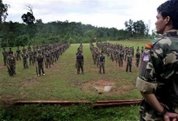
KATHMANDU - Nepal's Maoist rebels extended their ceasefire by three months on Friday in a bid to support peace talks aimed at ending their decade-old insurgency that has killed thousands.
The extension came hours before the truce -- declared after King Gyanendra ended his absolute rule in April -- was due to expire.
"Expressing the commitment and responsibility (for peace) our party has extended the ceasefire for another three months," Maoist chief Prachanda said in a statement.
He said an eight-point understanding between the rebels and the government last month was key to establishing lasting peace and ensuring progress in the impoverished country.
"But the government and seven political parties are trying to back out from it under different pretexts," he said.
"We strongly urge the government to show eagerness to advance the peace talks ... otherwise we will be forced to declare another strong peaceful movement," Prachanda said.
The rebels have been upset in recent weeks over what they say is a delay by the multi-party interim government of Prime Minister Girija Prasad Koirala to push the pace of peace talks and accused his coalition of trying to preserve status quo.
The rebels and the government have also differed over a government plan to seek the help of the
United Nations' to disarm the Maoist army in the run up to elections to draft a new constitution and decide Nepal's future.
The ceasefire extension came as Maoist representatives began talks with a team of U.N. officials on how the world body could assist the peace process in the troubled Himalayan country.
Officials said the meeting had started at an undisclosed location. They did not elaborate.
The seven-member U.N. team, headed by Staffan de Mistura, arrived in Nepal on Thursday and met Deputy Prime Minister and Foreign Minister Khadga Prasad Oli.
"This is an assessment mission that needs to understand the position of all interlocutors," de Mistura said on Thursday.
The rebels are demanding an immediate dissolution of the reinstated parliament and the formation of an interim government that would include them.
They also say that they are ready to keep their fighters and weapons under U.N. supervision but will not surrender them.
The Maoists have been fighting since 1996 to topple the monarchy -- a conflict that has killed more than 13,000 people so far.
The extension came hours before the truce -- declared after King Gyanendra ended his absolute rule in April -- was due to expire.
"Expressing the commitment and responsibility (for peace) our party has extended the ceasefire for another three months," Maoist chief Prachanda said in a statement.
He said an eight-point understanding between the rebels and the government last month was key to establishing lasting peace and ensuring progress in the impoverished country.
"But the government and seven political parties are trying to back out from it under different pretexts," he said.
"We strongly urge the government to show eagerness to advance the peace talks ... otherwise we will be forced to declare another strong peaceful movement," Prachanda said.
The rebels have been upset in recent weeks over what they say is a delay by the multi-party interim government of Prime Minister Girija Prasad Koirala to push the pace of peace talks and accused his coalition of trying to preserve status quo.
The rebels and the government have also differed over a government plan to seek the help of the
United Nations' to disarm the Maoist army in the run up to elections to draft a new constitution and decide Nepal's future.
The ceasefire extension came as Maoist representatives began talks with a team of U.N. officials on how the world body could assist the peace process in the troubled Himalayan country.
Officials said the meeting had started at an undisclosed location. They did not elaborate.
The seven-member U.N. team, headed by Staffan de Mistura, arrived in Nepal on Thursday and met Deputy Prime Minister and Foreign Minister Khadga Prasad Oli.
"This is an assessment mission that needs to understand the position of all interlocutors," de Mistura said on Thursday.
The rebels are demanding an immediate dissolution of the reinstated parliament and the formation of an interim government that would include them.
They also say that they are ready to keep their fighters and weapons under U.N. supervision but will not surrender them.
The Maoists have been fighting since 1996 to topple the monarchy -- a conflict that has killed more than 13,000 people so far.
No comments:
Post a Comment